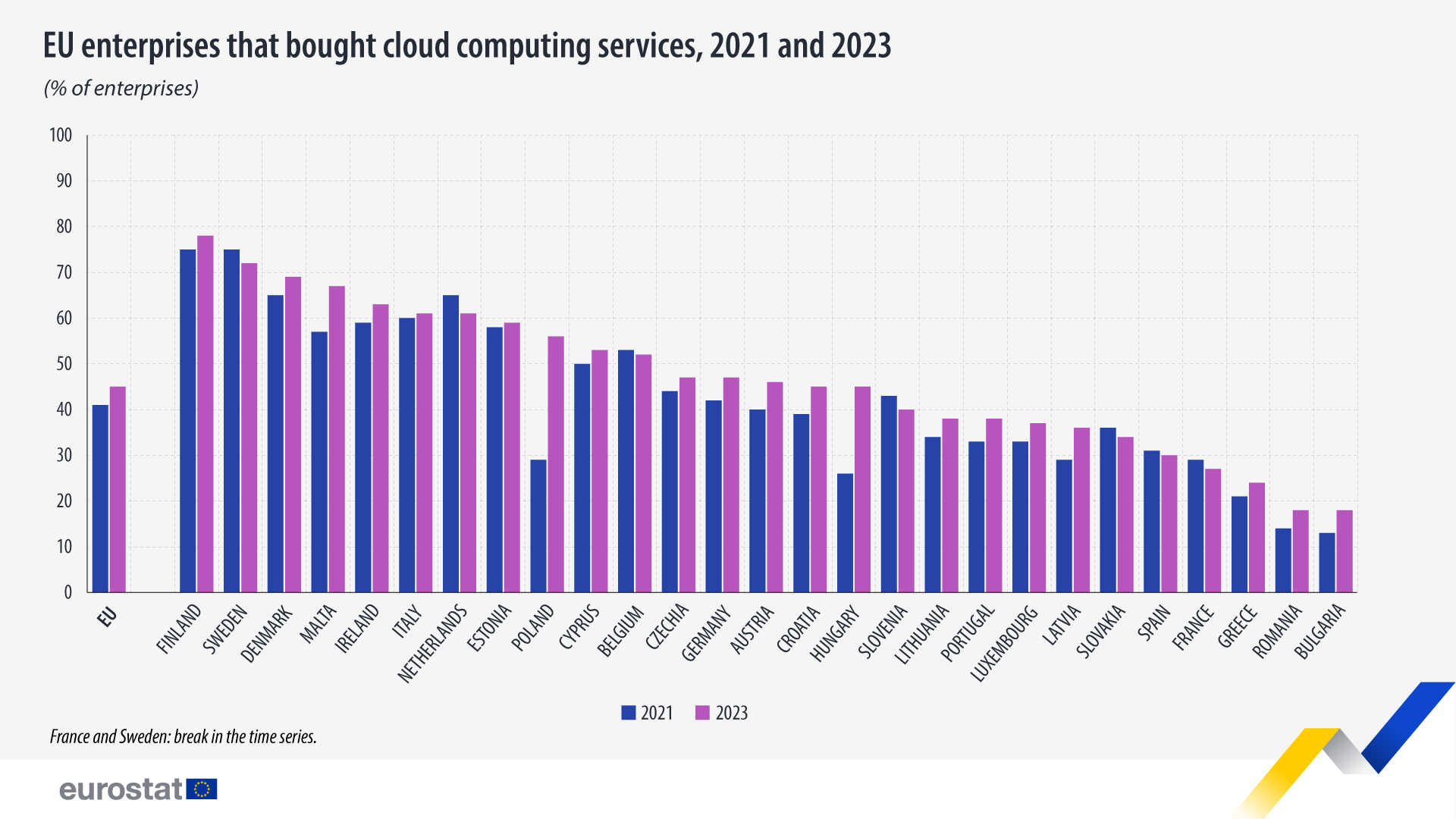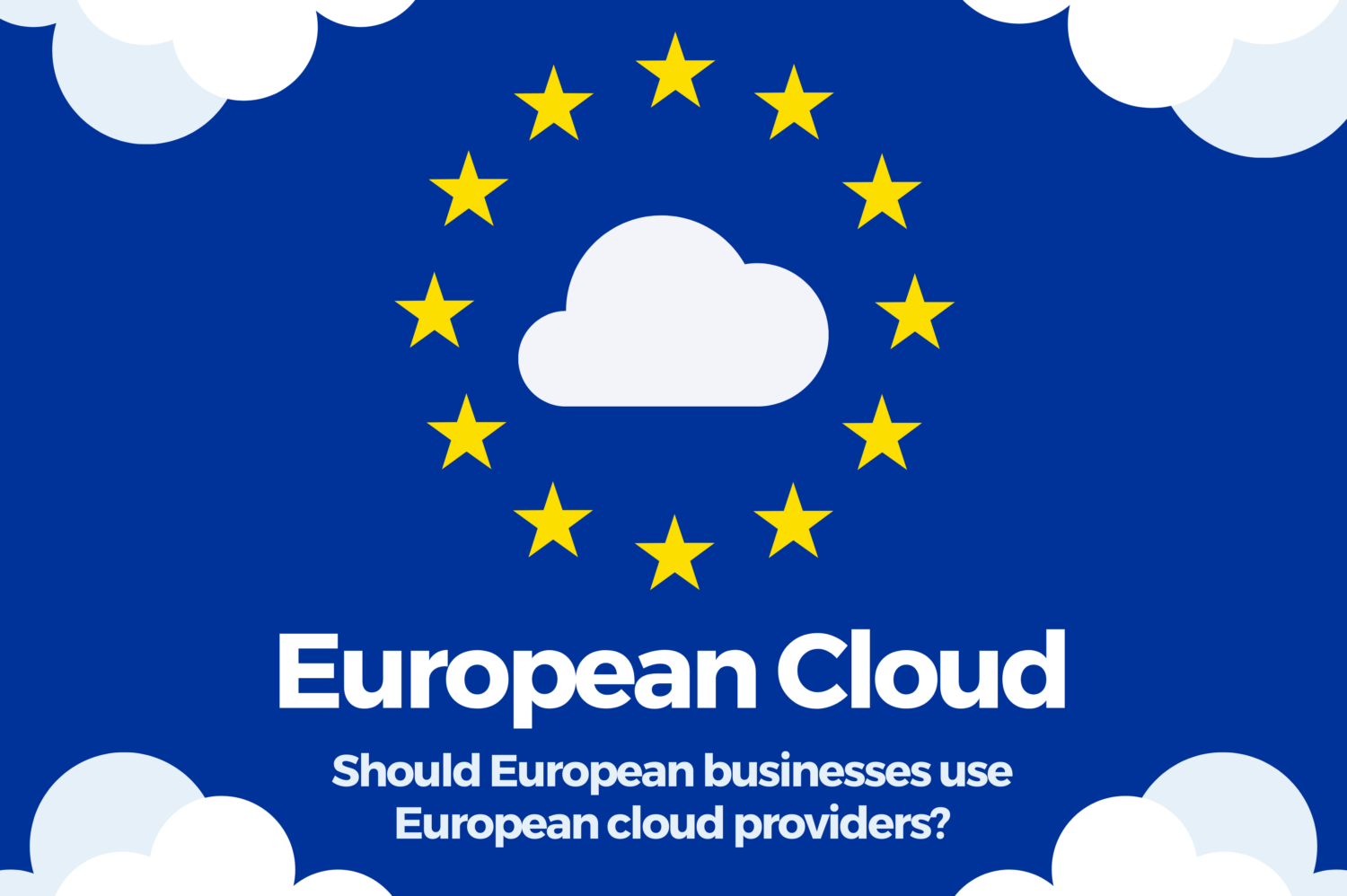Should European businesses use European cloud providers?
In an era dominated by digital transformation, cloud computing has become a cornerstone for businesses seeking agility, scalability, and innovation. The European cloud computing market is no exception and is experiencing substantial expansion, propelled by the growing embrace of Software as a Service (SaaS) and a demand for scalable IT solutions.
The European cloud computing market is expected to grow at a Compound Annual Growth Rate (CAGR) of 9% between 2024 and 2032, ending at a market value reaching around USD 115+ billion by the year 2032.
Today’s global cloud services Market is led by Amazon Web Services (AWS), followed by Microsoft Azure, Google Cloud and other US companies. European providers on the other hand are highly fragmented and account for less than 13% of the global market. A compelling case can be made for utilizing European cloud providers to foster growth, ensure compliance with regional regulations, and bolster data security and sovereignty.
In this article, we will explore the reasons why European businesses should consider partnering with cloud service providers based in their own continent.
Current state of European Cloud
According to a report on information and communication technology usage and e-commerce published by Eurostat, 45% of enterprises within the European Union procured cloud computing services in 2023. This denotes a 4.2 percentage point upswing compared to the figures recorded in 2021 and these numbers are expected to grow further.
This advance in technology can have great advantages for enterprise, however there are challenges that will have to be anticipated in order to ensure optimal functionality. The integration of cloud technologies varies significantly among EU nations, yet a common feature that unites all European countries are the strict Regulations that govern Cloud Computing Technologies, such as the GDPR (General Data Protection Regulation).
GDPR regulations extend beyond the borders of Europe. This regulation not only applies to organizations within the EU/EEA zone but encompasses any entity processing data, regardless of its location, when dealing with individuals based within the EU/EEA.
GDPR goes beyond the existing data protection laws in the United States and non-EU/EEA countries. However, this is not enough to guarantee the data protection of EU companies and government institutions. There are foreign laws that have been passed in the past years by the US and China that have little or no regard to the GDPR and require cloud computing companies to hand data to law enforcement, even when it is stored in Europe.
In the effort to preserve highly sensitive information such as personal data from the healthcare sector or public administration, many institutions have opted for secure clouds with a server location within the EU.
As the market grows, so does the demand for an European cloud providers that can ensure compliance with European regulations.
Countries like Sweden, the Netherlands, and Slovenia surprisingly obtained more cloud computing services in 2021 than in 2023. Finland (78.3%), Sweden (71.6%), Denmark (69.5%), and Malta (66.7%) reported the highest percentages of enterprises acquiring various computing services. In contrast, in Greece (23.6%), Romania (18.4%), and Bulgaria (17.5%), less than a quarter of enterprises were involved in such purchases.

How would Europe benefit from a European Cloud
Let’s take a look at some aspects in which a European Cloud could significantly benefit European enterprises and contribute to strengthening digital sovereignty and data portability within Europe.
Data Sovereignty and Compliance:
European businesses are subject to stringent data protection laws, most notably the General Data Protection Regulation (GDPR). European cloud providers inherently understand and adhere to these regulations, providing a level of data sovereignty and compliance that may not be guaranteed by their non-European counterparts. By choosing local cloud services, businesses can navigate regulatory complexities easier and build trust with customers who prioritize data protection.
Supporting European Innovation:
Collaboration with European cloud providers fosters a supportive ecosystem for local innovation. These providers are invested in the success of regional businesses and are more likely to engage in partnerships, research initiatives, and the development of cutting-edge technologies tailored to the European market. Choosing local providers can contribute to the growth of a vibrant and dynamic digital ecosystem within Europe.
Customized Solutions for Regional Needs:
European cloud providers are well-versed in the unique requirements of businesses operating within the European Union. They can offer localized solutions that cater to the specific needs of local industries, adapting to diverse regulatory landscapes, languages, and market conditions. This tailored approach enhances the agility and competitiveness of European businesses in a rapidly evolving global market.
Enhanced Security:
Security is a top concern for businesses in this digital age. European cloud providers implement robust security measures to safeguard data and underlying infrastructure. Due to strong focus on compliance with local regulations, these providers can offer assurances to businesses that their sensitive information is being handled with the utmost care, mitigating the risks associated with data breaches and cyber threats.
The European Cloud Project
In December 2023, the European Commission announced that they have approved up to €1.2 billion of State aid to facilitate the research, development, and initial industrial implementation of cutting-edge cloud and edge computing technologies, involving multiple providers throughout Europe.
The project is named IPCEI-CIS (IPCEI Next Generation Cloud Infrastructure and Services) and its goal is to strengthen Europe’s digital and technological sovereignty. Twelve EU member states are currently collaborating to establish an impactful and enduring “Multi-Provider Cloud-Edge Continuum,” involving over 100 partners within the EU.
“Cloud-Edge Continuum” is the name that was given to the smooth integration of edge and cloud computing, that will facilitate innovative approaches and optimized data processing and storage within distributed networks. Data and applications are strategically located either at the edge (in proximity to end devices) or in the cloud, depending on specific needs.
Such an approach would allow for swift processing of real-time data at the network’s edge, with fewer time- and security-sensitive tasks being executed in the public cloud.
With this project the Commission aims to address issues such as a lack of scalability, interoperability and transparency in the offerings, and at the same time maximize the innovation potential of the European economy.
Conclusion
In an era where digital transformation is reshaping industries, the choice of a cloud provider plays a pivotal role in determining a business’s success. European businesses stand to gain a few advantages by opting for European cloud providers. From ensuring compliance with regional regulations to fostering innovation and collaboration, the decision to choose local cloud services is not just about technology but also about supporting the growth and resilience of the overall European business landscape.
We are excited to see how the IPCEI-CIS unfolds and helps embrace the services of European cloud providers aligning businesses with the unique opportunities and challenges of the European market.
If you are thinking of unlocking the Power of European Cloud Solutions, we got you! The Cloudification team has extensive experience in private cloud, OpenStack, and Kubernetes, we are your trusted partners in navigating the complexities of choosing the right European cloud. Let us guide you seamlessly through the process, ensuring a smooth migration tailored to your needs. Give us a call today and explore the possibilities and elevate your cloud experience with us!

